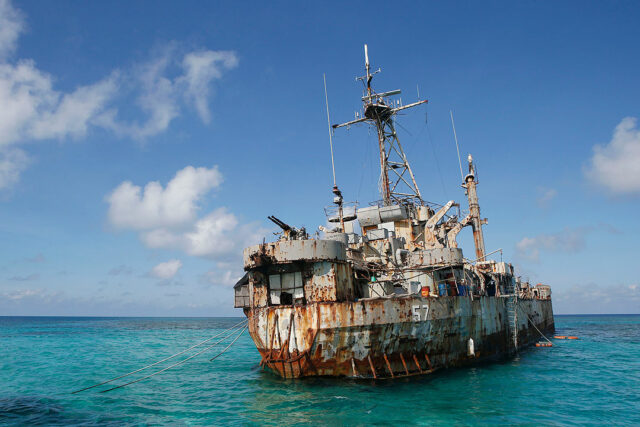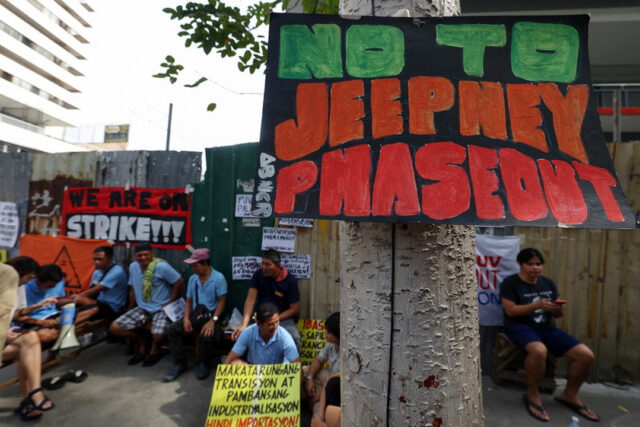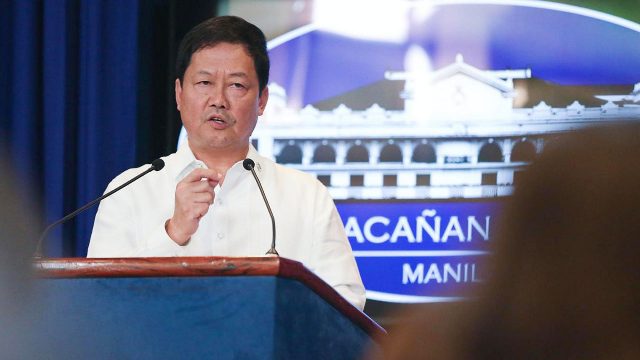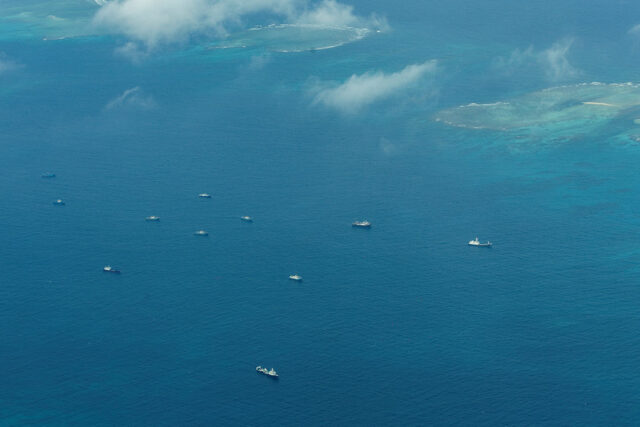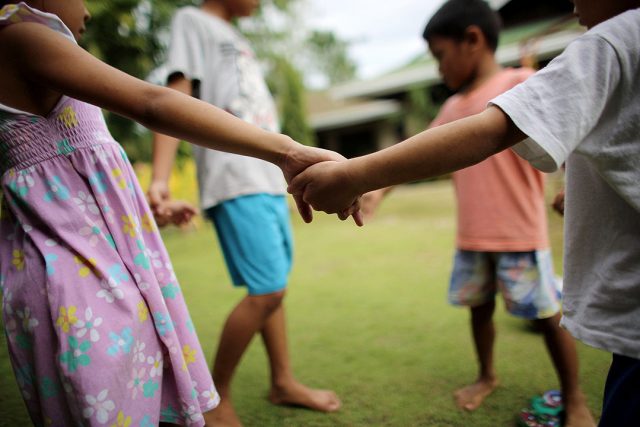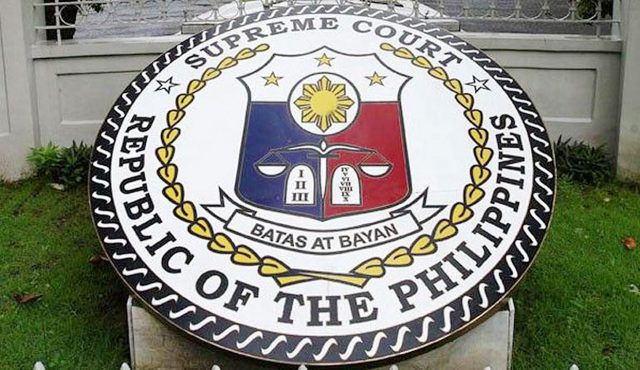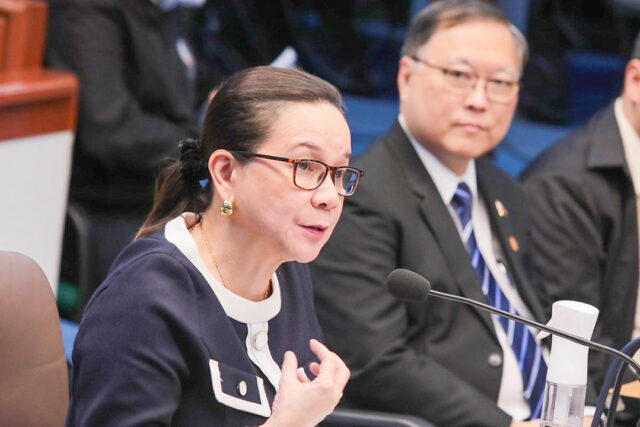By Kyle Aristophere T. Atienza, Reporter
THE PHILIPPINES and United States, a treaty ally, started joint air and sea patrols within Manila’s exclusive economic zone in the South China Sea on Tuesday, President Ferdinand R. Maros, Jr. said, amid increasing tensions with China.
The patrols between the Armed Forces of the Philippines and US Indo-Pacific Command, which will run until Nov. 23, is a testament to their commitment to boost their interoperability in conducting maritime and air patrols, he said in a statement.
“Through collaborative efforts, we aim to enhance regional security and foster a seamless partnership with the US in safeguarding our shared interests,” he added.
Mr. Marcos, who returned to Manila on Monday night after a weeklong trip to the US, said the joint maritime and air patrols are part of the series of events that have been agreed upon by the Mutual Defense Board of both nations.
“This drill is long overdue but it is better than nothing,” Joshua Bernard Espeña, who teaches international relations at the Polytechnic University of the Philippines, said in a Facebook Messenger chat.
To make the commitment stable, the Philippines must provide a “comprehensive logistics system that may anticipate scenarios for attritional warfare or conflicts for a long duration,” he said. “If not, this drill might fall into yet another signaling that does not necessarily translate to deterrence or operational efficiency.”
“The latter point also begs the need for Filipino allies to figure out how they can complement Manila’s gaps and check their own.”
Mr. Marcos visited the US Indo-Pacific Command headquarters during his trip to Honolulu, Hawaii, which was the last stop of his visit to the US.
Meanwhile, China slammed a Philippine proposal for a separate code of conduct on the South China Sea, saying “any departure” from the original declaration that provides the framework for a possible code of conduct involving China will be void.
Formulating the code “is an important task for China and ASEAN (Association of Southeast Asian Nations) countries,” China Foreign Ministry spokesperson Mao Ning said in a statement. China and ASEAN signed the declaration in 2002.
Mr. Marcos on Monday said the Philippines had approached neighbors such as Malaysia and Vietnam to discuss a separate code of conduct regarding the South China Sea, as he cited the slow progress toward striking a broader regional pact with China.
Relations between the two have grown more tense under Mr. Marcos, who has increasingly complained about China’s “aggressive” behavior while rekindling strong ties with the Philippines’ sole treaty ally, the United States.
Speaking in Hawaii at a livestreamed event, the Philippine leader said escalating tension in the South China Sea required the Philippines to partner with allies and neighbors to maintain peace in the busy waterway, with the situation now “more dire.”
“We are still waiting for the code of conduct between China and ASEAN, and the progress has been rather slow unfortunately,” Mr. Marcos said.
“We have taken the initiative to approach those other countries around ASEAN with whom we have existing territorial conflicts, Vietnam being one of them, Malaysia being another and to make our own code of conduct.
“Hopefully, this will grow further and extend to other ASEAN countries.”
A smaller code of conduct without China would open discussions about ways to enforce compliance, said Swee Lean Collin Kho, a research fellow at the Singapore-based Rajaratnam School of International Studies.
An intra-ASEAN code would likely have “greater inputs” concerning confidence- and security-building measures, he said in a WhatsApp message. “There would likely also be fewer hurdles concerning geographical scopes especially if the codes take the form of separate bilateral if not minilateral types.”
He also expects substantial discussions “about ways to ensure compliance, allow verification and enforcement against violations.”
Mr. Marcos had vowed to bring up the proposed code of conduct between Southeast Asian countries and China on the sidelines of the 42nd ASEAN Summit in Indonesia in May. It should be finalized “sooner rather than later because tensions are increasing,” he said at the time.
He made a similar push at the ASEAN Summit in Cambodia in November last year.
Raymond M. Powell, a team leader at Stanford University’s Gordian Knot Center for National Security Innovation, said a separate code would be a much different document since the primary but unspoken rationale for the original code of conduct is “to constrain the People’s Republic of China’s aggression.”
“The level of direct confrontation among those is currently very low, and they largely conform to the Declaration on Conduct (DoC) principles,” he said in an X message, referring to Manila, Vietnam, Malaysia and Indonesia. “It’s only China that does not.”
Mr. Powell said the original code proposal, which was first discussed in 2012, has given China time to consolidate its maritime power, leaving smaller nations helpless in the face of its expansionist agenda.
China’s neighbors have been subjected to “a slow and inexorable invasion over the two decades since the DoC was first inked,” he said.
“They saw the world stand by as China unilaterally upended the South China Sea status quo by carrying out an audacious artificial island construction program, in clear violation of the declaration’s principles of self-restraint and avoiding disruption and escalation,” he added.
‘BETTER CHANCE’
Mr. Powell, whose group has been monitoring gray-zone tactics in the waterway, said despite Chinese President Xi Jinping’s promise to then US President Barack Obama that “China does not intend to pursue militarization” of its artificial islands, it has been deploying combat ships and aircraft from these same bases “while also arming them with advanced missile systems.”
The bases have been used to “forward-deploy the rapidly growing number of coast guard and militia ships China uses to enforce its will,” he added, citing its advanced naval port facilities at Subi, Mischief and Fiery Cross Reefs.
“A code of conduct that excludes China would serve a noble purpose in speaking with a single voice on this issue, which would be a power message of unity,” Mr. Powell said. “For this reason, you can expect Beijing to be aggressive in insisting that any CoC must include China.”
A code of conduct between ASEAN and China has become a protracted process because of differences over issues such as the geographical scope and role of nonsignatories, Mr. Kho said. “Moreover, there’s concern about how to enforce the code, whether it’s binding or otherwise.”
While the proposal for a separate CoC might take years to be finalized, it should not be considered infeasible, he said, noting that ASEAN countries have engaged in territorial and boundary-related mechanisms in the past, including the mechanism between Indonesia and Malaysia on the Ambalat offshore block.
“ASEAN countries also engage in coordinated maritime patrols,” he said. “Even Vietnam has its own mechanisms with China in the Gulf of Tonkin, so I don’t see why Marcos’s proposal isn’t viable considering past examples.”
Mr. Kho said talks on a separate CoC could consider the role of the ASEAN High Council, which has yet to be tapped by member states as an arbitrating body.
It may also encourage them to turn to international mechanisms such as the International Tribunal for the Law of the Sea.
“This is much unlike the case of the currently negotiating CoC involving Beijing,” he said. “China doesn’t want international bodies to arbitrate maritime disputes like what we see in the case of the 2016 award. At least if the separate intra-ASEAN codes do materialize in whatever form, we can expect a better chance of the parties agreeing to such a recourse.”
Mr. Powell said China would likely “lean hard” on other ASEAN members to get the Philippine initiative rejected or ignored.
The Marcos administration will need to temper its expectations for a breakthrough since the target parties have spent decades “cautiously managing Chinese maritime aggression, and there’s nothing to suggest they are ready to change course,” he added.
“If history has anything to show, we do have a pretty positive track record of ASEAN member states turning to international legal recourse to address their maritime disputes if they couldn’t address them via political negotiations,” Mr. Kho said.
“So the proposed separate codes that Marcos suggested do have a potential to be effectively implemented,” he added.



